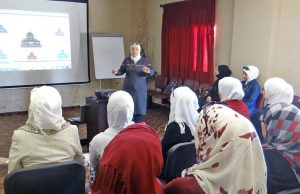
An instructor teaches Syrian refugees in Lebanon about how they can get involved in politics. Photo: Women Now for Development.
For this week’s column, I was debating writing about a few different topics that impact girls. It’s been a rough political week, both in the United States and worldwide, and I decided to do something different. I’ll be back to my regular formatted column next time.
Instead, this week’s column is a round up of three stories of varying significance that I’ve been following lately. All of the stories, I hope, are going to positively affect the lives of girls and allow them to reach their full potential.
The first story I’ve been following is news from out of El Salvador. I previously wrote about a pregnant teenage girl in the Latin American country last month.
Last week, El Salvador lawmakers voted to abolish a law that allowed men to marry underage girls who are pregnant. Critics of the law said the practice protected sexual predators from facing criminal prosecution. Activists argue that the 1994 law is discriminatory and routinely abused, particularly in poor, rural areas. The age of consent for marriage in El Salvador is 18, but an exception was made in 1994 for underage girls who are pregnant to marry with parental approval. Reform of the law is a small but important step to try and change cultural and societal beliefs about girls.
The second story comes from Lebanon. Similar to El Salvador, there was a law under which a rapist could be exempt from criminal prosecution if he married his victim. That law was scrapped last week by Lebanon’s parliament. The BBC reports that similar legislation has been done away with in Tunisia and Jordan.
Article 522 had essentially allowed for a second assault on a rape survivor’s rights in the name of “honor” by trapping her in marriage with her rapist. Women’s rights groups in Lebanon are declaring victory, but say there is more work that needs to be done in the fight for women’s rights. Next on their agenda is for Parliament to address the issue of marital rape, which is technically legal according to Human Rights Watch.
The third and final story is from Syria, where the country is in the midst of a brutal civil war. Human and women’s rights activists are working hard to ensure that girls and women have a seat at the table in the rebuilding of post-war Syria.
Organizations like Women Now For Development have been trying to challenge patriarchal norms. As the war has intensified, their focus has shifted from women’s financial power to helping support women and girls as they deal with displacement. The goal is to create links with women across Syria that empowers them to rebuild their country after the war.
Even before the war, women and girls faced much discrimination. The war and heightened religious extremism have only increased that discrimination, according to Syrian journalist Samar Yazbek. The Women Now organization has two support centers in Lebanon, and five in Syria. They help create a network for women and girls and provide education, support and a sense of empowerment.
Through dark and turbulent political times, it may seem like not much positive change is being made. To me, these stories highlight different steps being taken around the world to ensure the progression of the rights of women and girls. It may not seem like much, and it may be discouraging at times, but progress isn’t linear. With small political steps like these, we are actively improving the lives of the next generation of girls.
-Sage Daugherty
Junior Girl
Girl Museum Inc.
